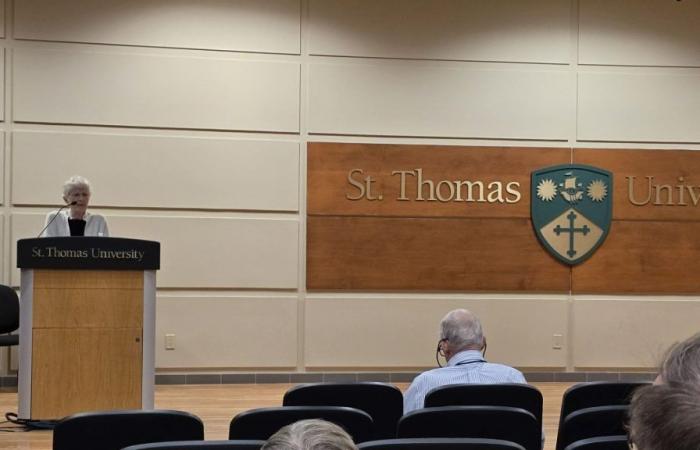A patient care attendant (PAB) lost so many patients in her long-term care center at the start of the COVID-19 crisis that she can no longer tolerate the sound of her winter coat zippering. It reminds her of the sound of the zippers of the body bags that carried away the people she cared for.
The Fredericton audience jumped when Pat Armstrong told this story during his talk on joy in long-term care last week. Caregivers are used to losing people, but not as many at once as was the case during the pandemic.
The eminent researcher coined the phrase “the conditions of care are the conditions of work”, which is now a slogan of nurses and other healthcare workers, and has even been echoed by Prime Minister Justin Trudeau.
Professor Emeritus Pat Armstrong captivated the audience of students, faculty, health care workers and administrators with her speech on the pursuit of joy in long-term care and retirement homes, as part of the memorial conference Dr T. LeRoy Creamer at St. Thomas University in Fredericton, October 3, 2024. This conference was organized by the Department of Gerontology at St. Thomas University and by Albert Banerjee, Armstrong’s colleague and former student, gerontologist and holder of the research chair in community health and aging.
Canada’s most respected health sociologist challenged the audience to think about how to “put life in years, not years in life.”
For Armstrong, there are three sources of joy to consider in long-term care.
The first concerns interpersonal relationships. Armstrong described the importance of meaningful relationships that can develop between caregivers, residents, families and volunteers. For Armstrong, this requires time and continuity of care. The lack of staff, on the other hand, means that the bare minimum is done to keep residents alive, instead of ensuring that life is enriched and worth living every day.
Practicing skills and building the capabilities of everyone in a care home, for both caregivers and residents, is the second source of joy, according to Armstrong.
“We need to put more trust in the people providing care to decide what should be done for and with a resident, based on what they know about the resident, but that also means there needs to be continuity of care so that they know the residents and that there is complicity between caregivers and patients,” Armstrong told CBC Info Morning Fredericton.
“We take it for granted that residents are not able to do things… In Norway, when we studied long-term care homes, we saw a choir of mostly people with dementia who were non-verbal, and this choir even performed in front of spectators. We need to think about the skills of residents and build on their abilities,” according to Armstrong.
At the conference, Armstrong told the story of a chef at a nursing home who found joy in preparing meals in a way that ensured residents received the nutrients they needed. Residents felt overwhelmed by the large portions of food they were served and did not eat their meals; so the chef found a way to serve meals in attractive portions for residents.
Choice is the third source of joy. Choices about food, clothing, leisure and privacy, and even death, make a difference in residents’ lives.
Armstrong challenged the idea that everyone wants to age in place. Home is not a safe space for everyone, and homes can also be lonely places. Long-term care facilities can be places where people find community and don’t feel like a burden on their family members.
A patient attendant who identified herself as a CUPE member confirmed Armstrong’s comments about staffing levels in this sector of care, highlighting the moral harm that results from this work. “We are fighting for our residents,” she said. She blamed Premier Blaine Higgs for the long-term care crisis, drawing applause from the audience. She’s not alone in thinking this way.
In response to New Brunswick Auditor General Paul Martin’s report released in June criticizing the Higgs government’s spending on for-profit recruitment agencies to the tune of $175 million, CUPE 1252, Council of New Brunswick’s hospital unions, representing more than 9,000 health-care workers, said the money should have been invested “in our hard-working existing health-care workers.”
The union noted that public sector attendants working in care earned $23 per hour, while those who were outsourced earned as much as $162 per hour, which is unimaginable. The union adds: “And that’s not all. No receipts are required for expenses such as airline flights, meals and hotels. Contracts are entirely drawn up by recruitment agencies, without any control. No legal control of contracts is applied. Companies bill for 12-hour shifts, while their employees work as little as 3.5 hours.”
“While the government pays public sector staff starving salaries, it rolls out the red carpet for corporate predators. Too much is too much! It’s time to end this welfare support to private agencies and invest in our public health workforce,” said CUPE 1252.
Health care election in New Brunswick on October 21
Armstrong’s conference was timely, as provincial elections will take place in New Brunswick on October 21. Health care is a major election issue.
Progressive Conservative Leader Blaine Higgs told an audience of business people at an event hosted by the Fredericton Chamber of Commerce at the University of New Brunswick on Oct. 7 that he will improve health care with his “increased business acumen” if re-elected for a third term as prime minister.
While privatization of health care in New Brunswick is described as booming, Susan Holt, leader of the Liberal Party, told Coop Media NB in March that her party would not further privatize health care and that he would review contracts with Medavie Blue Cross for health care services. This marks a change in policy from the last New Brunswick Liberal government, which outsourced telecare and other services to Medavie Blue Cross.
The Green Party’s David Coon said they would treat access to primary care as a right, eliminate wait times, make multi-million dollar investments and transform GP surgeries into a community collaborative medical team.
The NDP has committed to launching 40 community health clinics across the province, to joining the federal pharmacare initiative, to working towards universal pharmacare by removing premiums from the current plan prescription drug insurance while increasing the number of eligible people, and to expand the health insurance plan to cover mental health care.
In an interview with NB Media Co-op, Pat Armstrong was joined by her partner and colleague Hugh Armstrong, professor emeritus of social work at Carleton University and board member of the Ontario Health Coalition. Hugh Armstrong argued that the term “profitization” was more appropriate than “privatization” to describe health care problems, noting that nonprofits often hire for-profit agencies to manage them, that they are governed by business representatives and that they are managed according to business models.
Pat Armstrong says more money is needed in health care, “but it’s not just about money.” She wants strategies to be put in place to retain health workers, in particular by improving their working conditions. Armstrong, who is a board member of the Canadian Health Coalition, also said services must be maintained in the public system and profiteering must be eliminated from health care.
A health sociology student at St. Thomas University remarked that he didn’t expect to feel a sense of optimism after leaving a conference on long-term care, but that he was.
An audience member asked Professor Armstrong, “Where does Pat Armstrong find joy?” » Without hesitation, she replied, “Seeking to better understand and resolve this problem.”
Tracy Glynn is the Director of Operations and Projects for the Canadian Health Coalition.
The original French version of this article was published by the Canadian Health Coalition on October 10, 2024.






